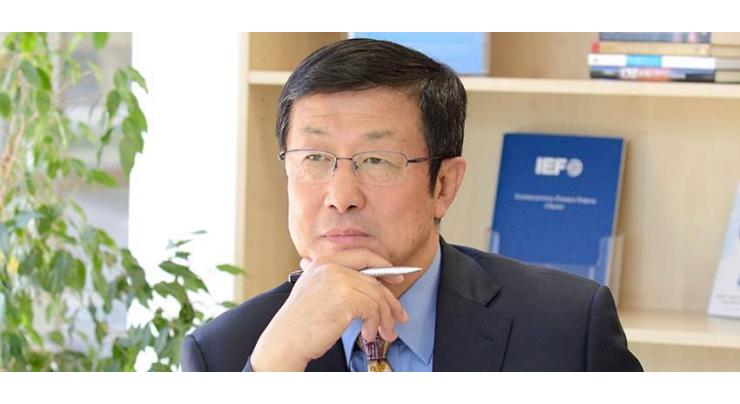
- Home
- Business
- News
- IEF Chief Praises Oil Producers Postponing Decision on New Production Cuts Until December
IEF Chief Praises Oil Producers Postponing Decision On New Production Cuts Until December
Faizan Hashmi Published November 13, 2018 | 06:55 PM

International Energy Forum (IEF) Secretary General Sun Xiansheng told Sputnik on Tuesday that the next session of the Joint Ministerial Monitoring Committee (JMMC) of the Organization of the Petroleum Exporting Countries (OPEC) and other members of oil output freeze deal, slated for December, is the right time to determine new levels of oil production cuts.
"Yes, in December they will have a meeting of the group as a whole.
"Yes, in December they will have a meeting of the group as a whole. They will have a more serious discussion. They will have a look [at the market] for a short time from now until the December meeting, less than one month, so they can observe the performance of the market and then make the decision. I think it is the right time," Sun said on the sidelines of the ADIPEC conference in Abu Dhabi.
The JMMC is comprised of six members: co-chairs Saudi Arabia and Russia, Kuwait, Oman, Venezuela and Algeria plus the United Arab Emirates, this year's president of the OPEC Conference.
At Sunday's meeting, the committee reached no recommendation to cut oil production. The next JMMC meeting will be held in Vienna on December 5.
"I think so. The purpose for them is to seek market balance, but sometimes it is difficult. [If the oil output cut is] within the reasonable range, it is OK," Sun said when asked if he supported the decrease in production.
OPEC and several non-OPEC oil producers, including Russia, reached a deal in Vienna in 2016, agreeing to cut oil output by a total of 1.8 million barrels per day in an effort to stabilize global oil prices. Non-OPEC states pledged to jointly reduce oil output by 558,000 barrels per day. The agreement, which came into effect in 2017, has been extended twice since then and is expected to remain in force until the end of 2018.
Related Topics
Recent Stories

PTI to stage nationwide protests against alleged electoral frauds

Senate continues discussion on Presidential address to Joint Sitting of Parliame ..

Masood Khan calls for Pak-US cooperation for regional peace

Interior Minister starts Margalla Trail Patrol for security

Currency Rate In Pakistan - Dollar, Euro, Pound, Riyal Rates On 26 April 2024

Today Gold Rate in Pakistan 26 April 2024

ICC Womens T20 World Cup Qualifier, Match 2: Ireland Women open with Comfortable ..

Robinson, bowlers help New Zealand go 2-1 up against Pakistan

Shahzeb Chachar to hold khuli kachehri on April 26

Heatwave amid Israel's aggression in Gaza brings new misery, disease risk

Tourism must change, mayor says as Venice launches entry fee

Court adjourns Judicial Complex attack case till May 17
More Stories From Business
-
Shipping Activity at Port Qasim
29 minutes ago -
Machinery equipment assembling grew by 70.98% in 08 months
2 hours ago -
Gold rates up by Rs.2,500 per tola to Rs245,000
2 hours ago -
Miner Anglo American rejects BHP's $38.8 billion takeover bid
2 hours ago -
Exchange rates for currency notes
4 hours ago -
Foreign exchange rates
5 hours ago
-

Currency Rate In Pakistan - Dollar, Euro, Pound, Riyal Rates On 26 April 2024
5 hours ago -

Today Gold Rate in Pakistan 26 April 2024
6 hours ago -
Chinese minister felicitates Ahsan Iqbal on reappointment as Planning minister
15 hours ago -

Pak-US officials engage to enhance trade, investment ties
16 hours ago -

Stocks fall as tech shares sink, US economy slows
16 hours ago -

Higher taxes, awareness help decrease cigarettes sale in Pakistan
17 hours ago










